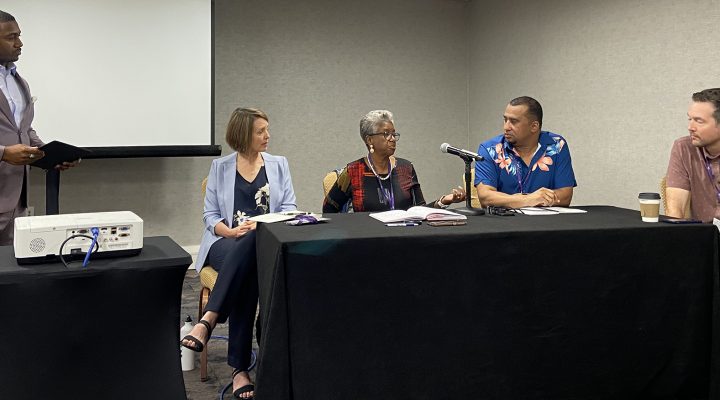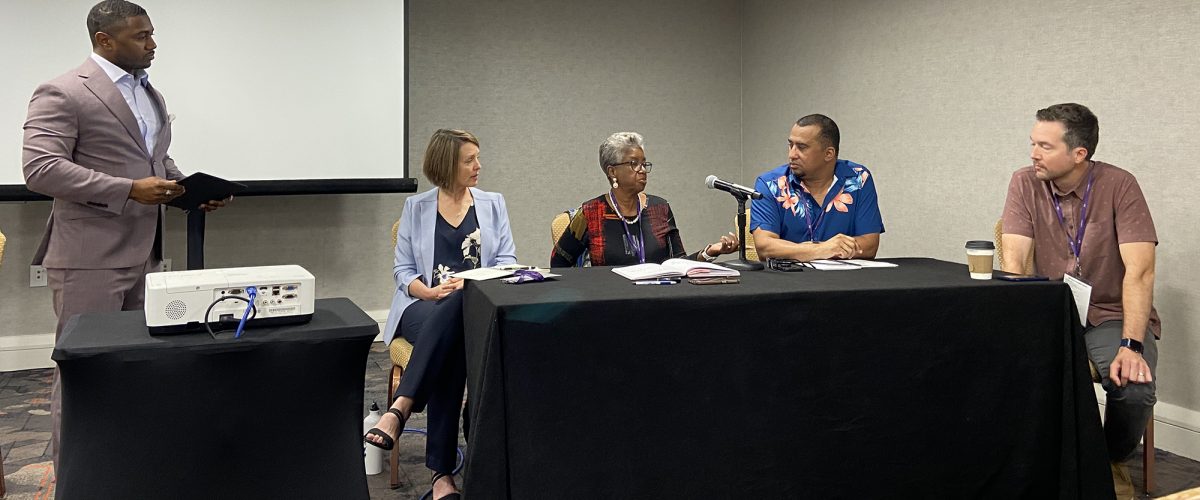Practicing advocacy in the pulpit can be like walking through a “fiery furnace,” five pastors noted during the Cooperative Baptist Fellowship General Assembly in Atlanta June 29.
Cheryl Moore Adamson of Palmetto Missionary Baptist Church in Conway, S.C.; Jesús Garcia of Church of the City in New London, Conn.; Charles Hamilton of New Morning Light Baptist Church in Conley, Ga.; Carol McEntyre of First Baptist Church in Columbia, Mo.; and Garrett Vickrey of Woodland Baptist Church in San Antonio talked about “Advocacy in Preaching” in a CBF learning labs breakout session.
Moderator Hamilton asked the other pastors to define advocacy, a prompt that moved them to consider their parallels to three ancient Hebrews — Shadrach, Meshach and Abednego — who survived being thrown into a Babylonian furnace, as recorded in the Old Testament book of Daniel.
Advocacy is “being the influence for those who do not have influence,” Garcia said.
Advocacy is “being the influence for those who do not have influence.”
“It is giving voice to the voiceless, access to those without access,” Adamson added, noting it involves supporting “persons with diminished capacity.”
Advocacy also involves “not working for, but working with — using our power with people,” McEntyre said.
The story of the fiery furnace offers a metaphor for getting involved in advocacy, Vickrey said, explaining pastors “might get burned but accept responsibility for the opportunity” to speak on behalf of others.
“My experience with fire is a lived experience,” Adamson added, noting she was among the first group of Black students in her community to integrate into a predominantly white high school. “It’s almost like being inoculated from the effects of the flames,” she said. That doesn’t mean living without fear, “but appropriating what Jesus does for you, so you are grounded.”
And preaching in the fire is a contemporary experience, the other pastors agreed.
In today’s fraught social and political climate, speaking up for one group of people sometimes makes another group of people angry, Vickrey said.
That means they are keeping good company, Garcia added: “For Jesus, the people were always first. People are always going to be first.”
However, the fire that accompanies such a commitment has been intensified by “the political climate of recent years,” McEntyre observed, conceding, “I’m already dreading the next election cycle.”
“I lean into pastoral care” as a way to advocate while trying to turn down the flames of conflict, she added. “If people know I love them, that stretches them and informs how they can hear me.”
But sometimes a preacher’s task involves feeling the heat, she stressed, recalling an angry letter she received from a church member when she prayed in worship after police killed a person of color. “As pastors, there are times when we have to speak up. If I don’t speak, I might as well pack my bags.”
The messages pastors deliver outside the pulpit reinforce the sermons they deliver from the pulpit, Vickrey noted. “It’s really important to say in the hallway what you would say in the pulpit — so you’re not just dropping a bomb (in a sermon) and leaving.”
“That’s being consistent,” Garcia agreed, adding pastors must lead “both in the pulpit and in the community.”
Implementing education and advocacy in other aspects of congregational life in addition to worship likewise is vital and supports preaching, Adamson said.
Leading congregational Bible study “is plowing the ground” for how congregants receive sermons, she said. “Get them rooted in the word, so they see the sermon as a point of reference. … Seeing ‘what the Lord requires of us’ is providing members with tools (for living out ideals expressed in sermons) in their homes and communities.”
“You can’t let preaching be the heavy lifter of all your advocacy work. It’s too heavy.”
In the current national climate, a related task is to “untangle the gospel from white Christian nationalism,” McEntyre advised. “That’s heavy lifting. … And you can’t let preaching be the heavy lifter of all your advocacy work. It’s too heavy.”
At her church, Bible study, book studies, small-group conversations and one-on-one relationships supplement the advocacy emphasis that also appears in preaching, she said.
Beyond that, social media now extends the message, Adamson added.
“The challenge of social media is people outside our congregations now hear our sermons,” she said. The downside of that is social media provides “no context” for the streamed sermons. But the good news is “people are hearing what we are saying.”
Sometimes, advocacy involves other topics than political issues, Hamilton observed, and the panelists agreed.
“I start from the bottom to the top — with children,” Garcia said, noting how he advocates for Church of the City to be multigenerational. “We put children in the front, and that will bring families. We do ministry together, purposefully mixing the groups.”
Adamson said “everything is politics,” but that includes more than issues debated by political parties. “Our common life together is political, in the public square. Jesus is concerned about who gets what, when and where.”
Years ago, when he was “still in the honeymoon phase” of his pastorate, Vickrey recalled, he took on the challenge of moving the nursery and children’s ministry away from an unsecured main hallway where youngsters were vulnerable. The pastor’s involvement “got change the children’s minister had not been able to do,” he said. “That’s a kind of advocacy.”
The panelists agreed with Hamilton’s assertion that balancing advocacy and other content in sermons is vital.
“It’s really hard. You could preach about what’s in the news every Sunday,” McEntyre said, noting it’s “always a struggle” to know how to address public issues in corporate worship. Sometimes, an important public event can be mentioned in introductory remarks or in the pastoral prayer. “But some days, you’ve just got to scrap the whole (already prepared) sermon” and address an event that happened that week and is on congregants’ hearts and minds.
Selecting appropriate Scripture passages is an effective way of raising advocacy in worship, Adamson insisted.
“Opportunities will arise by the Holy Spirit through the word of God,” she said. “We can marry the Old Testament and New Testament stories to the lived experiences of the people. Scripture is there to do for us what we can’t do for ourselves.”
Vickrey agreed. “It’s important for us as Baptists to keep Scripture central,” he said, noting scriptural emphasis avoids the temptation to pick up “cable news talking points” while helping to “clearly define your terms.”
“Also, it’s important to have an ask,” he added, urging a call for action that brings worshipers into the business of advocacy themselves. “Maybe you ask them to walk the aisle and sign a note — so people can feel they are doing something.”


